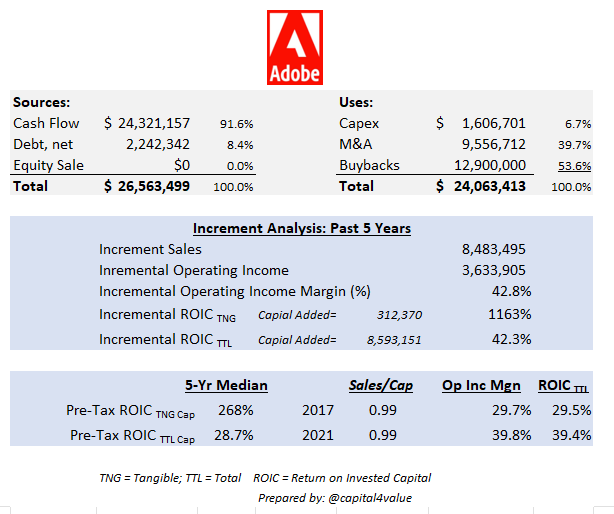
#smb #investing
Want a quick "back of the napkin" forecasting tool to estimate future capital requirements?
Use the Sales-to-Capital ratio
Total Capital = NWC + PPE, net + Goodwill/Intangibles
(For private co with accel depr use gross PPE)
Explanation... 👇
Want a quick "back of the napkin" forecasting tool to estimate future capital requirements?
Use the Sales-to-Capital ratio
Total Capital = NWC + PPE, net + Goodwill/Intangibles
(For private co with accel depr use gross PPE)
Explanation... 👇
1/x
What is it?
Sales to capital (S/C) ratio looks at how much revenue a company generate per $1 of capital
$1mm of revenue using $600K of capital equates to a 1.66x Sales to Capital ratio
Why does this matter? 👇
What is it?
Sales to capital (S/C) ratio looks at how much revenue a company generate per $1 of capital
$1mm of revenue using $600K of capital equates to a 1.66x Sales to Capital ratio
Why does this matter? 👇
2/x
Observations:
- The ratio is industry specific - unit economics influence & bound the ratio
- For established co's, the S/C ratio is fairly stable & can increase over time
- For young co's, it is generally low, but will increase over time
Observations:
- The ratio is industry specific - unit economics influence & bound the ratio
- For established co's, the S/C ratio is fairly stable & can increase over time
- For young co's, it is generally low, but will increase over time
3/x
Factors:
S/C ratio is impacted by:
- Net working capital requirements
- Fixed capital requirements
- Acquisition costs
The higher the (above) Capital costs, the lower the ratio
A higher ratio equates to better value-add
Factors:
S/C ratio is impacted by:
- Net working capital requirements
- Fixed capital requirements
- Acquisition costs
The higher the (above) Capital costs, the lower the ratio
A higher ratio equates to better value-add
4/x
How to forecast:
Company currently has a S/C ratio of 2.5x, capital of $500K, & $1.25mm of revenue
Believe revenue can DOUBLE in 5 years
How much capital do you need to grow? 👇
How to forecast:
Company currently has a S/C ratio of 2.5x, capital of $500K, & $1.25mm of revenue
Believe revenue can DOUBLE in 5 years
How much capital do you need to grow? 👇
5/x
Rev in 5 yrs (est): $2.5mm
Capital in 5 yrs: $1.25mm
Current Capital: $500K --> $1.25mm in 5 yrs
You need $750K over the next 5 years
Now you can ask questions like:
How will you finance this?
Can we be more efficient with capital?
How do we reduce capital requirements?
Rev in 5 yrs (est): $2.5mm
Capital in 5 yrs: $1.25mm
Current Capital: $500K --> $1.25mm in 5 yrs
You need $750K over the next 5 years
Now you can ask questions like:
How will you finance this?
Can we be more efficient with capital?
How do we reduce capital requirements?
• • •
Missing some Tweet in this thread? You can try to
force a refresh







